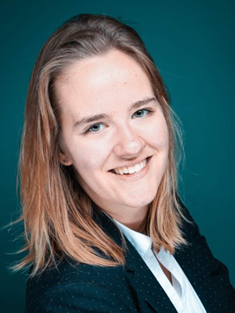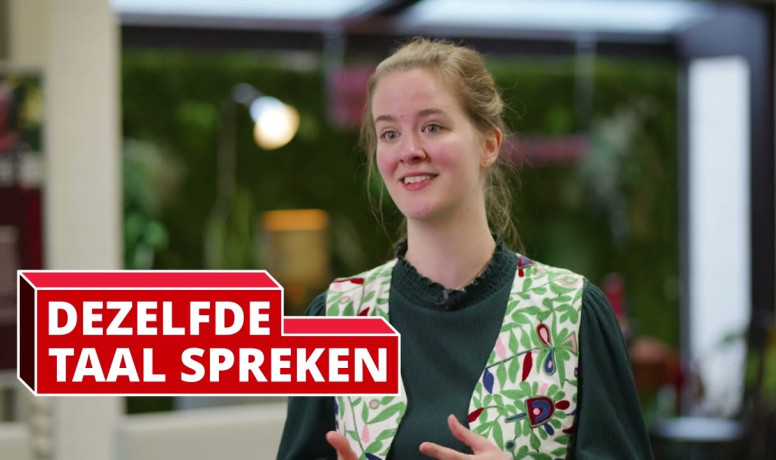The lexicon of the Radboud University
A common language for educational information
"Education is music, and the institution is the orchestra. My dream for education is that we find ways to play more harmoniously as an orchestra." Speaking is Pien Walraven, who has been Information Manager at Radboud University since the end of 2022. With a lexicon for education, she wants to improve ensemble playing.
Key facts
Who: Pien Walraven
Position: information manager and guest researcher information science
Organisation: Radboud University
Topic: lexicon for education
Challenge: fragmented educational terms and practices make collaboration and system design difficult.
Solution: a lexicon based on educational concepts creates a common language and thus supports interoperability.

Pien Walraven
Her field of expertise is business–IT alignment in complex organisations – in other words, how to ensure that IT and the organisation are properly attuned to one another. “In an educational organisation there is no straightforward answer to that. A student, a lecturer or a manager will each see it differently. In organisations with a linear process, such as a biscuit factory, it is simpler.”
Fragmentation of educational information
Together with colleagues in the Education Domain team, Pien supports decision-making around digitalisation. A major project is the preparation of a new curriculum information system, in which the development of the lexicon is being carried along. The reason? One of the challenges Radboud aims to address with this project is the reduction of fragmented educational information.
Each faculty – and sometimes even each individual programme – applies its own practices and terminology. At times a single word has multiple meanings, while in other cases different programmes use different words for the same concept. Since this information originates already during the educational design phase, the university has chosen to begin work there. “That is the process in which the data are created that will later be needed throughout the entire chain. By starting here, you tackle the cause at its source.”
"We discovered that it is not a technical issue, but rather that people simply do not understand each other. That insight became the starting point for the lexicon."
Concepts rather than labels
During the assessments, the team discovered that people often fail to understand one another. That insight became the starting point for the lexicon, which is based on concepts rather than labels. One programme talks about courses with modules, another works with minors and units. At first sight these appear to be different structures, making harmonisation difficult.
“The lexicon shows that a ‘subject’ and a ‘course’ can essentially represent the same concept,” says Pien. “In a system you can then agree to use the term ‘course’, even if each programme employs a different word. In this way, programmes don’t need to be forced to change their own terminology, but the dialogue is facilitated.”
Contribution to interoperability
Sometimes the reverse is true, and it turns out that the same term carries a different meaning. The lexicon makes this visible, so that systems and processes can be organised accordingly. It provides a different perspective from an alphabetical glossary or a reference architecture. It is not about imposed definitions or best practices, but about the way systems and processes are set up in daily practice. In this way, the lexicon contributes to both semantic and organisational interoperability. Semantic, because the meaning of concepts is shared. Organisational, because teams and departments can coordinate more easily when they use the same language.
"It saves a lot of time because you no longer spend half of the meeting on Babylonian confusion of tongues"
Practical approach
Step by step, the lexicon is finding its place within the organisation. In preparing the tender for a new curriculum information system, the team is working along two tracks. On the one hand, they are creating process maps that show what curriculum preparation can look like – from redesigning a course to a review at programme or faculty level. Roles and responsibilities are defined, and the process maps consistently apply the same terminology.
On the other hand, the lexicon itself is being further developed in terms of content. Concepts and terms are used consistently so that they become useful both in discussions and in the design of systems. “It saves a great deal of time because you no longer lose half the meeting to Babylonian confusion,” says Pien. “You think you are talking about the same thing, but in fact you are not. With the lexicon, conversations become more productive.”
Open to feedback
For information managers and architects, the lexicon is already useful in discussions and project preparations. However, the experience of programmes and policy staff is that in its current form the lexicon is still not sufficiently accessible for independent use.
Pien stresses that the project is still evolving: “I am very open to feedback, because we are not there yet. It is an iterative process in which we learn and make adjustments. We have a core working group of seven people, but transparency is paramount. The platform is public, and experiences are shared through a LinkedIn group."
"With the lexicon we are looking for the golden mean: creating a shared language while preserving academic freedom."
Constructive dialogue between technology and education
The experiences in Nijmegen are not unique. Elsewhere too, people are asking how programmes and faculties – or even entire institutions – can work together without losing their own identity. “Universities are organisations where autonomy is a core value. That should be cherished,” says Pien. “At the same time, structural cooperation is often difficult. With the lexicon, we are seeking the golden mean: ensuring a shared language while preserving academic freedom.”
Meanwhile, the lexicon is also finding its way into other organisations and networks, for instance through conference presentations. At the European level, too, Pien sees opportunities: through the Neurotech Alliance, discussions are under way about how the lexicon might contribute within a European university alliance. In the coming years, Pien envisions the lexicon developing further into a widely used tool. “Our ambition is for it to become a vehicle for making the dialogue between technology and education more constructive. I believe it can be a tool that really helps us listen to one another and move forward together.”
Want to know more or work together?
Do you recognise yourself in this story and would you like to join the lexicon working group (one-off, occasional or structural)? Join the SIG group on LinkedIn or contact Pien at pien.walraven@ru.nl!
Also read more about the project on the project page and watch this video.
Want to know more about interoperability? www.surf.nl/en/themes/interoperability
Video Radboud University: Building education with a curriculum information system

